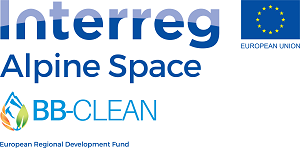In the BB-CLEAN project 8 partners from 5 countries of the Alpine Region (AR) were working together to develop transnational policies for a sustainable use of biomass for domestic heating to minimize its negative impact on air quality and improve a smart use of biomass in the AR.
Biomass covers a large share of heat demand in the AR which can reach 90% for small municipalities in the Alps. That is why there was a need to support a better use of local resources and increase the energy self-sufficiency while reducing the impacts on climate and the environment. Biomass is available and affordable RES and its combustion involves critical aspects related to atmospheric particulate (PM) emissions, polycyclic aromatic hydrocarbons (PAHs) and volatile organic compounds (VOCs). Often unknown to population and local administrators is that biomass burning (BB) leads to consistent particulate matter (PM) emissions. They have an impact on natural ecosystems, on human health and even on climate change considering Black Carbon concentrations contained in PM emitted from BB.
The project focused on innovative open-source and interactive approaches for the awareness raising of citizens and local administrators about the critical aspects linked to BB and on the definition of strategic technological, economical and regulative tools to reduce the impact of BB in the Alpine valleys. The development of shared policy-relevant documents favoured the application of harmonized regulations for a sustainable use of biomass in the AR.

Basic data about the project:
Programme: Interreg Alpine Space
Project acronym: BB-CLEAN
Project title: Strategic tools towards a sustainable use of biomass for low carbon domestic heating
Start date: 17.4.2018
Project duration: 36 months
Project budget: 1.665.715,40 € (KSSENA budget: 160.973,00 €)
Lead partner: Università Cattolica del Sacro Cuore
Partnership: 8 partners from 5 European countries


